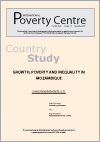
Growth, Poverty and Inequality in Mozambique
Abstract:Mozambique has experienced more than a decade of sustained economic growth based on two sectors, agriculture and industry. Absolute poverty has fallen rapidly. The main factor in the reduction of poverty since the mid 1990s has been increased production in agriculture, the main source by far of livelihoods in the country. However, this growth represents only a ‘bounce-back’ to pre-war levels of agricultural production, without any substantial improvement in productivity, which remains very low even when compared regionally. Growth in industrial production has been the main driving force behind Mozambique’s rapidly growing exports. Based on a few mega-projects, this growth has, however, created few jobs while its contribution to public revenue has been marginal when compared to its value of production. Due to the enclave character of such projects, the spillover effect in terms of technology transfer or skills development has been minimal. External aid provides a major part of all foreign exchange available to Mozambique, and it has thus far had a positive effect on growth without major negative impact on the real exchange rate. Aid must be allocated now to crucial services for creating globally competitive agricultural production capacity, including rural infrastructure, in order to promote sustainable livelihoods and enhance labour productivity.